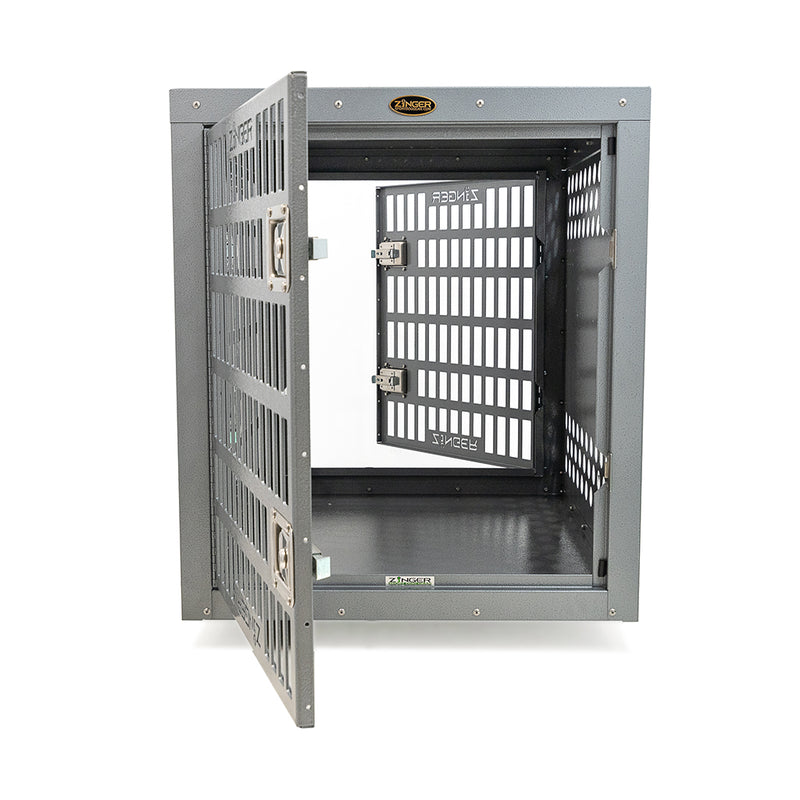Your Cart is Empty
Electronic Collars
Collars and Leads
Dog Tracking Systems
Dog Training
Bird Launchers
Hunting Dog Supplies
For The Hunter
Are Pumpkins Safe For Dogs?
October 27, 2021 6 min read 3 Comments

It is that time of year, folks. Pumpkins are everywhere, whether used for seasonal decorations or an additive for all kinds of food and drinks, from baked goods to coffee. Pumpkins are a very versatile source of nourishment. As dog owners look for ways to improve their pets' health, many wonder if the fall favorite, pumpkin, is a good option. This may leave you wondering, “Is pumpkin safe for my dog to eat?”
Before we go into the safety of dogs consuming pumpkins, let’s briefly cover what a pumpkin is. Pumpkins are a member of the winter squash family, native to North America, and are best known for their deep orange coloration and round bodies. They have a thick shell that contains the seeds and pulp. Pumpkins are rich in vitamins and minerals, as well as dietary fibers. Depending on whom you ask and what their field of study is, pumpkins can be referred to as either a fruit or a vegetable.
Are pumpkins safe for dogs to eat?
The quick answer is absolutely; pumpkin is safe for dogs to eat and is often listed as a dog “superfood” for some of its health benefits and usage as a treatment for digestive issues. Dogs can eat several forms of pumpkin and even the seeds are safe for dogs.
Precautions Before Feeding Dogs Pumpkins
Before we get into the different safe and healthy forms of pumpkin for your dog, let’s cover some precautions you should consider first. When introducing any food to your dog for the first time it is important to only introduce a small amount first to test to make sure your dog does not have any food allergies to that food. Pumpkin is listed as a low risk to food allergies but it is still best to introduce it slow. If your dog shows signs of discomfort, such as vomiting, diarrhea, or itching, stop feeding them pumpkin and consult with your vet.
Even though pumpkin spice season is upon us, pumpkin spices and seasonings are a no-go for dogs. If you’ve been keeping up with our blog series on foods you should or should not feed your dogs, then you’re already well aware that spices and seasonings should never be added when preparing food for your dogs. For more information about the dangers seasoned vegetables or meats, read: Meats to Never Give Your Dog and Four Fruits to Never Give Your Dog.
Something that I cannot stress enough is to never feed your dog pumpkin pie filling. Pumpkin pie filling contains additives and spices that can be harmful to dogs. Pie filling often contains sugar additives, which are bad for dogs because they are responsible for causing diabetes, tooth cavities, and kidney infections. If the pie filling uses xylitol as a sweetener, this is toxic to dogs and can be deadly if consumed in large enough amounts. Pumpkin spices that are included are often ingredients, like nutmeg, which is also toxic to dogs as it contains a compound called Myristicin. Unfortunately, Myristicin is known for the potential to cause disorientation, hallucinations, increased heart rate and blood pressure, and even seizures.
Canned Pumpkin
Store bought canned pumpkin can be a quick and easy way of adding pumpkin to your dog’s diet. Canned pumpkin is often an ingredient featured in homemade dog treats, which we will cover in a later blog article, so stay tuned! When purchasing canned pumpkin from the store, make sure you only get pure and unsweetened pumpkin. Check the ingredients to make sure that it only lists pumpkin or pumpkin and squash, which is sometimes added in with the pumpkin, but squash is perfectly safe for dogs as well.
Cooked Pumpkin
Pumpkin can be cooked by roasting, boiling, or steaming. Cooking brings out the natural favors of the pumpkin and will make it tastier for your dog. Some dogs will not eat raw pumpkin because of the unfavorable taste, but will happily enjoy cooked pumpkin. It is important that when cooking pumpkin to remove all of the pumpkin skins first, as pumpkin skins are tough and although they are safe in small amounts, they should not be included for best results. Also when prepping the pumpkin for cooking, de-seed the pumpkin, but be sure to keep the seeds because they are safe for dogs as well. We will cover the options of feeding pumpkin seeds in a bit. Again, and most importantly, Do Not season the pumpkin before, during, or after cooking.
Raw Pumpkin
Raw pumpkin is safe for dogs, but should be introduced in very small amounts as it can be harder on the digestive system. Some dogs will straight up refuse to eat raw pumpkin, depending on their taste buds and preferences. If you are giving your dog a whole pumpkin to chew on and eat, it is important to remove the stem before giving it to your dog. The stem can break apart and splitter easily, then possibly cause damage or obstructions if swallowed. Raw pumpkin is harder to digest for your dog, so it is important to limit the amount that they eat to ensure a healthy digestive system.
Pumpkin Seeds
Pumpkin seeds can be fed raw, cooked, or even ground up and used as a food additive. Pumpkin seeds, like the skins of the pumpkin, can be hard on the dog’s digestive system due to them being harder to digest. This is why some dog owners prefer drying the seeds and grounding them into a powder. By doing this, you can then add the pumpkin seed powder to their food for the added nutrients. If buying pumpkin seeds from the store, make sure to only ever purchase raw, unseasoned seeds. A large portion of pumpkin seeds purchased at stores will have additives and seasonings to make them more appetizing for human consumption, but will create unnecessary health risks to dogs.
Health Benefits of Pumpkins
Pumpkin has several health benefits, ranging from mineral and nutrient contents, to its dietary fibers, and its use in weight control. Pumpkins are loaded with naturally-occurring dietary fibers that have benefits in promoting a strong and healthy digestive system. These fibers can be used to help aid when a dog is suffering from both diarrhea and constipation. The high fiber content is also useful in controlling weight.
Pumpkin is also contains a good source amount of carbohydrates that work to provide your dog with a boost in energy, meaning that pumpkin can be used as an alternative to supplements for working dogs. Pumpkins are also rich in minerals and vitamins like carotenoids, vitamin E, iron, and potassium. Iron is important in the production of hemoglobin. Vitamin E acts as an anti-inflammatory and ensures good heart function. Potassium is important for maintaining muscle and nerves. Carotenoids are great for skin and eye health.
Pumpkin is often used to aid with diarrhea. The high soluble fiber contents of the pumpkin works in slowing down the digestive system and absorption of food in the small intestine. By slowing down the digestive system and offering support in nutrient absorption, it helps your dog from suffering from lack of nutrient absorption often associated with diarrhea.
When your dog is suffering from constipation, instead of grabbing a laxative, 1 to 4 tablespoons of pumpkin can help get things moving. The high dietary fibers are easier on the digestive system and more effective than laxatives, plus it’s from a natural source. If your dog is suffering from constipation due to health issues, like an enlarged prostate or anal sac disorder, pumpkin is not going to work and you should take your dog to a medical professional.
For more on the importance of a dog’s digestive system see our article: Importance of the Dog’s Digestive System
Pumpkin as a Natural Remedy
If all the above mentioned benefits weren’t enough, pumpkin can also be used as a natural remedy for worms and parasites that are affecting your dog’s digestive system. Pumpkin, especially the seeds, contains an amino acid called cucurbitin. Cucurbitin works to paralyze and eliminate parasites in the dog’s digestive tract. This benefit can be achieved from feeding whole seeds or ground up seeds that have been added to your regular dog food. Using pumpkin as a natural de-wormer has the benefit of avoiding the side effects of chemical de-wormers, which side effects are diarrhea and vomiting.
Cautions with over consumption of pumpkin
As with most things, too much of a good thing can be a bad thing. Excessive pumpkin consumption can cause digestive issues. Too much fiber in your dog’s diet can cause digestive distress and inhibit the proper absorption of nutrients. Pumpkin is also high in vitamin A, which in large amounts becomes toxic, though a very large amount of vitamin A is needed for this to be a concern.
Conclusion
Pumpkin is considered by some as a dog superfood with its many benefits and health effects. Should you add pumpkin to your dog’s regular diet? Well that is up to you, but it wouldn’t hurt to have a can of pure pumpkin puree in the cabinet for a quick treatment for dog digestive issues, should the need arise.
Thank you for reading. We hope that you found this information on pumpkin useful!
- Michael Cassatt, Director of Marketing
3 Responses
DANIEL HIGMAN
November 26, 2021
Thank you, I appreciate you taking the time to post these important side issues. i have enjoyed doing business with you all these years.
Linda Schillinger
October 30, 2021
Great information. Thank you.
Leave a comment
Comments will be approved before showing up.
Subscribe
Sign up to get the latest on sales, new releases and more …
Featured Products
 Sale
Sale

Subscribe
Sign up to get the latest on sales, new releases and more …



Tom
November 11, 2024
Been feeding pumpkin, both canned and home grown,for years. Halloween is good time to solicit left overs from neighbors!!